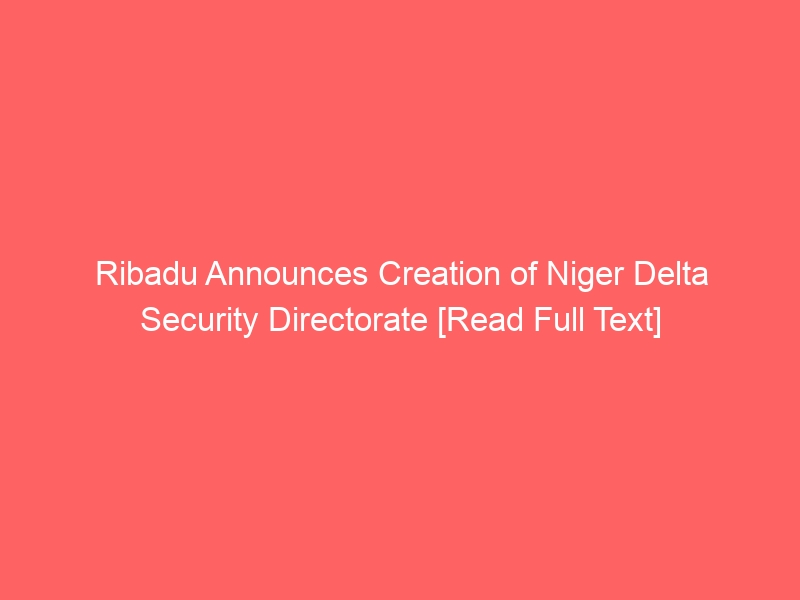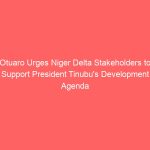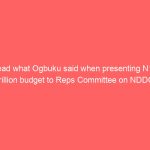National Security Adviser Nuhu Ribadu, on Wednesday at the Niger Delta Stakeholders Summit 2024 in Port Harcourt, Rivers State, revealed plans to establish a dedicated directorate within his office focused on the security challenges of the Niger Delta. This initiative marks the first time the Office of the National Security Adviser (ONSA) will have a specialized unit for the region.
Ribadu emphasized that this directorate will work with regional governors, community leaders, and other stakeholders to address the unique security issues in a focused and professional manner. He stressed the importance of integrating the Niger Delta’s security into President Bola Tinubu’s broader national security vision, which prioritizes human and socio-economic development over purely kinetic operations.
The new directorate will collaborate with various stakeholders, including traditional rulers, women, youth, students, government security agencies, and businesses, to support the President’s comprehensive policy on Niger Delta security. This approach aims to tackle issues like crude oil theft, pipeline vandalism, and youth militancy, which significantly impact the region’s stability and economic contributions to Nigeria.
Ribadu reiterated the Niger Delta’s critical role in Nigeria’s economy and the need for sustainable development policies that address environmental issues and promote community engagement in the hydrocarbon industry.
Read Full text below:
SUSTAINABLE DEVELOPMENT OF NIGER DELTA: A NATIONAL SECURITY OUTLOOK
A Paper Presented by the National Security Adviser, Nuhu Ribadu, at the Technical Session of Niger Delta Stakeholders Summit
INTRODUCTION
I am very delighted to be here today as the Special Guest of Honour at this all-important Summit. The Theme of this Summit which is Renewed Hope for Sustainable Development in the Niger Delta could not have been more apt, given the efforts being made towards the Renewed Hope Initiative of the current administration of our President and Commander-in-Chief of the Armed Forces, Federal Republic of Nigeria, Asiwaju Bola Ahmed Tinubu, GCFR in the last one year.
When I was appointed by President Bola Ahmed Tinubu, GCFR to the Office of National Security Adviser (ONSA), established under Section 132 of the Constitution to provide strategic advice on matters relating to National Security, three things were clear in my mind about the Niger Delta Region.
They are;
- That the Niger Delta must be clearly captured in a more active and determined way as a National Security priority in the vision of President Bola Ahmed Tinubu, GCFR and his Renewed Hope Agenda.
- That within the President’s broader and long-term National Security vision, which includes moving internal security from the current strong posture from kinetic to non-kinetic operations, I will emphasize security from human and socio-economic development point of view to deepen democratic culture in the Niger Delta.
- In view of the above two central ideas, I am determined to set up, for the first time in the ONSA, a Directorate that shall specialize in security of the Niger Delta through which we can, as Stakeholders, take a critical look at the peculiar security challenges of the region in a focused and professional way.
Accordingly, my team on Niger Delta (led by my Special Adviser on Energy Security and Niger Delta Affairs) is current working closely with the Governors of the Region and the Presidency. They will eventually include all Stakeholders of the region such as:
- Community Leaders, Traditional Rulers, Women, Youth and Students.
- Government Security Agencies (GSA).
- Federal Government Agencies (FGA) relevant to the region.
- Businesses.
- Civil Society, Peoples Organization and Media.
We will have very robust engagement to support the President articulate a Compressive Presidential Policy on Niger Delta Security. We should expect that when that fully materializes, the President will most likely personally present policy guidance that will define his security management posture for the sustainable development of the Niger Delta, under the Renewed Hope Agenda.
Distinguished Guests, Ladies and Gentlemen
LET ME GIVE YOU A CLUE INTO EMERGING POLICY DIRECTION
To supply an appetizer into the thinking of the Presidency flowing from my Office and the ongoing consultation with the Governors of the Region, the President recognizes that Niger Delta Region provides an estimated 75% of Nigeria’s foreign exchange earnings. Also evident is that most of Nigeria’s Maritime domain and international coastline outside of Lagos, all of which are within the Gulf of Guinea, are in the coast of Niger Delta and this region is critical to the development of Nigeria Blue Economy.
The political and socio-economic progress of Nigeria is therefore heavily tied to the social stability of the Niger Delta. Before 2024, 1.8 million barrel per-day production quota was allotted to Nigeria by OPEC. However, only about less than 1.4 million barrels per-day with a short-fall of 600,000 barrels per-day is produced. This is due to socio-economic issues that relate to security such as Crude Oil-theft, pipeline vandalisation, environmentally harmful artisanal refining, Sea piracy and youth militancy.
The President is deeply concerned that the purpose of Federal Agencies, which was to respond to socio-economic issues, stabilize, and integrate the region is not proving successful if we cannot produce our allotted quota. This is why a collaborative policy and intervention framework has become necessary.
DRIVERS OF CONFLICT AND INSECURITY IN THE NIGER DELTA
The ONSA is consulting widely, collecting, and building a body of knowledge, information and data that will eventually help Mr. President prescribe policy, and create laws that will address in a more holistic and coordinated way. The security and conflict situation in the Niger Delta so as to enhance sustainable development.
Key areas of interest include the following:
- POLICY THAT RESPONDS TO YOUR PEOPLE’S CULTURAL AND HISTORICAL SENSIBILITIES
Niger Delta is a region of ethnically diverse peoples. We recognise that you are republican and independent in your psychological traits.
Culturally, leadership among you is symbolic and remains stable only when it reflects a high degree of social consensus. This sense of independence or autonomy and at same time interdependence reflects in the history and nature of your past and present internal and external conflict. It can be observed that such conflict is associated with strife for cultural, political, and economic autonomy or independence among your groups and institutions outside of yourselves. Therefore, the failure to understand and respond favourably in policy to your sensibilities generated a lot of insecurity.
All these and more reveals your culturally formed traits, shaped your behaviour, and inform the nature of current conflict in the region that has affected our collective security as a nation. Your communities and your groups and their expressed views and desires will, therefore, be key to policy making for peace and social stability.
- ECOLOGY AND ENVIRONMENTAL POLLUTION
Niger Delta is the world’s tenth largest and Africa’s largest deltaic ecosystem. It is ecologically highly diverse, complex, sensitive, and logistically challenging. Your people have braved, survived, and made their home out of this ecosystem. The oil and gas business and its negative externalities places a lot of pressure on your physical and social ecosystem and the people’s livelihood.
This has introduced an additional layer to the nature and context for current conflict dynamics, as pollution to air, water, vegetation, and land has implications for health, livelihoods, ecosystem sustainability and future survival, with demonstrable consequences for National Security.
The President hopes to make policies for sustainable development that address the implication of environmental issues to security as a central theme.
- SOCIO-ECONOMIC CONTEXT TO SECURITY AND CONFLICT
Nigeria’s centralised, top-down, rent-dependent and patronage driven political-economy, led by and founded on oil and gas industries, has tended to pressure and dislocate the traditional economy and livelihoods of rural people of the Niger Delta.
This is due to the following:
- Livelihood losses from Environmental pollution.
- Migratory labour toward fast modernizing economy of your region, which displaces you in your traditional economy.
- The constraints placed on you for access, for opportunities, and decision-making process and for effective participation in the oil and gas economy for your communities.
- Social tension generated by the policies centred around ownership, control and management of oil and gas by sub-national stakeholders particularly the communities.
The nature of the political economy and the socio-economic fallouts provides another important layer of conflict and security with implication for social stability and National integration, that impacts National Security.
- CULTURE AND VALUES CONTEXT TO SECURITY AND CONFLICT
The traditionally welcoming and hospitable communities of the Niger Delta, at the onset of the oil and gas industry, have turned hostile, including aligning with rogue elements at all levels. This proves to be a result of the progressive loss of culture seen in family, community, and societal values that underpin deep ecology and sustainable development. Every form of imaginable corrupt practices and behaviour now form part of social patterns that generate conflict and erode social harmony. Many attribute this to degenerating national leadership, political culture, and the inability of communities to cope with and survive under happening changes in a way that preserves traditional value systems. Mr. President considers this as critical to rebuilding the most import infrastructure of hearts and minds upon which all other development depends. - GOVERNMENT RESPONSE
One more important layer of challenge that continues to inform conflict, is the response of government to situation in the region. Laws, policies, regulations, behaviour, practices, agencies charged with development, and models employed by these agencies, including values and choice of leadership, have all tended to create systems for patronage, entitlement, and benefit capture rather than a productive and value-creating economic and socio-political system. This confine intended benefit from reaching communities at the bottom of the socio-economic pyramid. Attempts to complain or resist are often responded to with heavy-handed military solutions that create and sustain tension.
The President has become deeply aware that sustainable development is not just about more monies but the values and methods through which monies are applied. This will therefore also inform the President’s desire for comprehensive policies measures.
POLICY SOLUTION
To solve current conflict situation and transition toward a more stable, harmonious, and better nationally integrated peoples and communities of Niger Delta.
Overarchingly, this will involve implementing development on a collaborative partnership framework of stakeholders supported by clearly defined, spatially well-planned Socio-Economic Intervention and Intelligence-led security and policing response.
Which includes the following:
- Pushing a strong Kinetic security perspective that increases the risk for perpetrators of oil theft, artisanal refining, Sea piracy and armed militancy
- Pursuing a collaborative perspective with stakeholders for Socio-economic Development with National Security as focal purpose.
- Promote reorientation in values in an Ideology supportive of National Harmony and Integration.
- Engage professional and technically supported, incorporated Host Communities’ companies as Trained and Regimented Guards for Critical Assets, supervised by Government security agencies under the Governor in the long run.
- Deepening Community Participation in Hydro-carbon Business.
- Broaden the base and capacity of policing at Sub-national level.
CONCLUSION
Sustainable peace, security and social stability of the Niger Delta Region that increasingly move away from Kinetic engagement (Stick-model) towards non-kinetic engagement (Carrot-model), will flow from coordinating the responsibilities of relevant organs of Public-sector, Private-sector, Development-sector, civil society and media toward a clearly, articulate and better planned understanding of the nexus between security and Development.
Accordingly, to achieve an optimal outcome for set security priorities and objectives, Mr. President thinking as a democrat, for his “Renewed Hope Presidential Policy on Niger Delta Security”, shall derive its legitimacy and credibility from listening to the people, their governments at State and LGA levels, leadership of communities, businesses and civil society, building consensus and creating systems that will address identified limitation.
As my Office puts this process in place, we hope to get into action soon, bring all stakeholders to make contributions.
Until that is fully in place, kindly be reassured that the Niger Delta has assumed a new sense of meaning and priority in my office. With the best of luck, we would get there.
Distinguished Guests, Ladies and Gentlemen, thank you for listening.












